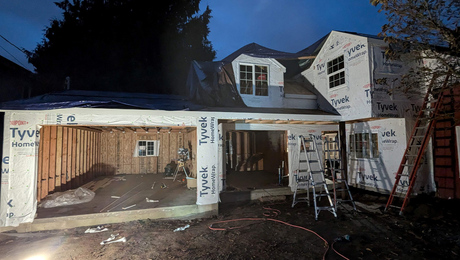I just finished my second glass mosaic tile shower inspired by a couple of great FHB over the years. Last time I used an epoxy grout. Anyone who has done it, knows that it is a huge pain. All my online searching has been inconclusive. Can I just go with a regular grout and seal it? It is for my own home. We keep the bathroom pretty clean…Do I need the epoxy?
Edited 3/14/2007 8:19 am ET by gohabs















Replies
You can use regular grout with a sealer.
But the real test is in how you built the shower. There must be moisture protection behind the tile.
Support our Troops. Bring them home. Now. And pray that at least some of the buildings in the green zone have flat roofs, with a stairway.
There is cement board on the walls and the floor is poured concrete. I installed rubber membrane for the floor and climbing 8-10 inches up the wall behind the cement board. The membrane is layed on a first layer of sloped concrete, with a goodly slopped layer on top. Is that enough?ap
Better use the epoxy grout.
Support our Troops. Bring them home. Now. And pray that at least some of the buildings in the green zone have flat roofs, with a stairway.
You don't need epoxy grout in residential. You can certainly use it, but in a sense it's overkill.
You wrote that you used a "concrete preslope", it might just be terminology, but normally deck mud is used instead of concrete. Deck mud is a very dry and lean portland cement mixture, with a higher sand:portland ratio and less water in the mix than concrete. You place it and pack it into place. Anyhow...
Your floor sounds fine...mud preslope, then membrane on top of that, another layer of mud on top of the membrane that serves as your tile base, then thinset and tile.
Lapping the membrane 8" up the wall is good.
Behind the cement board is good.
For the walls...did you put a drainage plane behind the cement board, between the framing and the cement board?
The walls, from framing to tile, should be: framing, drainage plane (visqueen or tar paper), with the drainage plane lapped over the 8" of pan membrane where it runs up the wall, then cement board, then thinset and tile.
Epoxy grouts, and their hybrid derivatives, like Spectralok, are good products...but not quite neccessary in the limited use of residential baths.
Careful using epoxy grouts with glass. The epoxy cures rock hard, it's quite rigid with virtualy no flex. The glass is weaker than the epoxy. Any movement or flexing in the walls can cause the glass to break.
Have you heard of Kerdi? It brings the floor and wall membrane to right behind the tile, eliminating any potential of deep wetting of the wall or pan structure.
Mongo